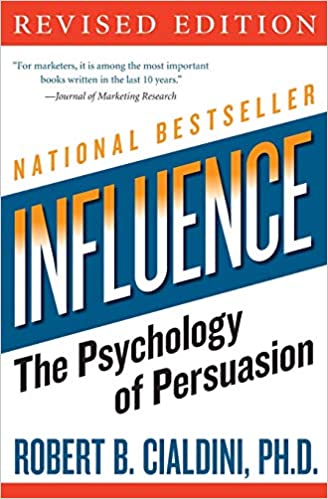Have you ever left a negotiation feeling beaten and bruised, like you never even had a chance? Often, smart yet unprepared sales professionals get torn apart in their meetings.
Some consider initial failings to being part of the school of hard-knocks sales negotiation training journey. But does the path to negotiation success have to be treacherous?
Many successful negotiators state the importance of practicing before the game, not in the game. Attraction and charisma only go so far when you’re up against a tough-as-nails competitive negotiator whose upcoming performance review is dependent upon ensuring that you get less than a fair deal.

influence
by Robert Cialdini
⏱ 14 minutes reading time
🎧 Audio version available
Know Your Strategy
If your negotiation strategy isn’t apparent to you, how can you expect to enjoy results that benefit your company? If senior management hasn’t made your strategy clear, which is, sadly, too often the case; make sure you ask.
Choose Your Negotiating Style
Are you willing to lose a battle to win the war? Are you ready to compromise and meet in the middle? Will you fight to the bitter end? Make sure to choose a negotiating style that best fits the circumstances.
Identify Goals
Do you want to maximize short-term value or work to build a longer-term collaboration that grows in value over time? Make sure you know what you want going in instead of settling for what you end up with.
Prepare A SWOT Analysis (which stands for Strength, Weakness, Opportunity, and Threat)
A simple, but often overlooked, tool. Think of the external opportunities and threats as the walkaway positions on both sides. The true power in any negotiation is having developed limits; meaning knowing when to walk away. Understanding this detail may not get you the deal you want, but it will keep you from agreeing to a lousy deal.
List Pre-Meeting Questions
Once you understand someone’s motivation, you are in control. In negotiations, information is the key. If you hope to win the negotiation, and stack the cards in your favor, you should learn all you can about the other side’s decision-makers, underlying interests, and walkaway position.
Compile Options / Deal Design
Negotiations are an opportunity to get creative. Work with your team to put together a complete list of options to consider in designing your deal. If you’re not happy with numbers, make sure someone on your team is. Make sure to leverage your SWOT’s “Opportunities.”
Form A Trading Plan
Loaded with information from your pre-meeting questions, you are ready to start prioritizing your concerns. What can you trade? What can you get in return? Start with your most critical interests or goals.
Set The Agenda
If you don’t set the negotiation agenda and take control, the other side will. Email your agenda before hand, and print a copy to use during the talks.
Build an A-Team
Avoid entering talks alone. Anyone who has ever been huddled knows the dangers of feeling isolated. The same goes for planning to negotiate. So, it’s vital to cooperate with a colleague or two. Make sure that your negotiation team knows your strategy and respective roles. Without clearly defining these aspects, you run the risk of contradicting each other at the negotiating table, which could lose you the upper hand.
Listen and understand the other side’s issues and point of view.
Some of the worst negotiators do all the talking, trying to control the conversation through force and expound continuously on the merits of their position. The best negotiators are the ones who genuinely listen to the other side, understand their major issues and hot buttons, and then form an appropriate response. Try to understand what is necessary to the other side, what limitations they may have, and where they may have flexibility. Refrain from talking too much.
Keep the negotiations professional and courteous.
This is also known as the “don’t be an asshole” rule. Nobody really wants to deal with a harsh or abusive personality. Even after the negotiations are finished, you may continue doing business with this person, or the transaction may require ongoing involvement with the representative of the other side. Establishing an excellent long-term relationship should be one of the goals in the negotiation. A collaborative, positive tone in negotiations will definitely result in progress.
Be prepared to “play poker” and be ready to walk away if needed.
You must be ready to leave the negotiations if the deal isn’t up to your expectations. Know before you begin what your target price or walkaway price is. Get your market data prepared to back up why your price is reasonable, and if you are confronted with an ultimatum that you can’t live with, be prepared to walk away.
Keep in mind that time is the worst enemy of many deals.
The longer completing a deal takes, the more likely it is that something will go wrong. So be prompt at responding, contact your lawyer to turn documents around immediately, and keep the deal momentum going. However, that doesn’t mean you should run through negotiations and make grants you don’t need to make. Recognize when time is on your side and when time is your true enemy.
Now that you have a straightforward process for preparation, how much time should you invest in your preparation? Try to invest at least three times the amount of time you expect to negotiate. So, a two-hour face-to-face meeting needs about six hours of practice. This doesn’t mean that you need to spend six straight hours locked in a room preparing. Alternatively, pace your team and yourself in the days and weeks of training before the meeting. What do you think?
What is your experience doing business pitches? How much do you prepare for negotiations? Share your opinion in the comment section! Don’t forget to like, share, and subscribe so you don’t miss anything, and you can enjoy the excellent content we send your way!
What Is Snapreads?

With the Snapreads app, you get the key insights from the best nonfiction books in minutes, not hours or days. Our experts transform these books into quick, memorable, easy-to-understand insights you can read when you have the time or listen to them on the go.


